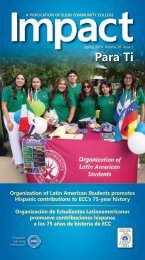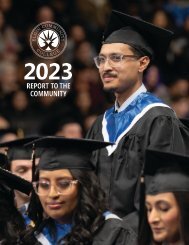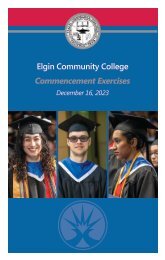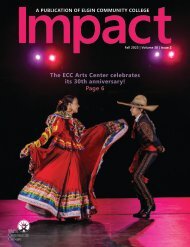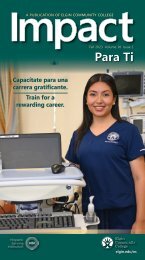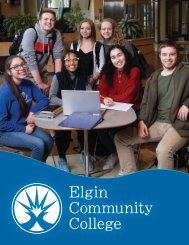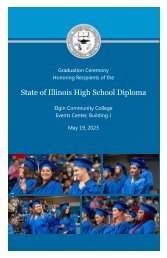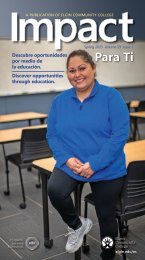ILEA Equity Plan | Elgin Community College (ECC)
There are wide and persistent gaps in college completion rates in Illinois, especially among students of color and low-income students. After an in-depth analysis of our institutional data, Elgin Community College (“ECC” or “the College” or “we” or “our”) has developed an Equity Plan containing annual growth targets for which progress updates will be shared publicly over the next five years. Our Equity Plan reflects the unique characteristics of our institution. For example, ECC is designated as a Hispanic Serving Institution by the US Department of Education, with just over 42% of the students identifying as Latinx or Hispanic. Also, the district served by ECC is widely diverse in terms of income and educational attainment. We will identify the obstacles students face and develop programs and policies that break down unnecessary college graduation barriers. Along with our fellow colleges, in the Partnership for College Completion organization, with this Illinois Equity in Attainment (“ILEA”) plan, we pledge to close the completion gaps by 2025.
There are wide and persistent gaps in college completion rates in Illinois, especially among students of color and low-income students. After an in-depth analysis of our institutional data, Elgin Community College (“ECC” or “the College” or “we” or “our”) has developed an Equity Plan containing annual growth targets for which progress updates will be shared publicly over the next five years. Our Equity Plan reflects the unique characteristics of our institution. For example, ECC is designated as a Hispanic Serving Institution by the US Department of Education, with just over 42% of the students identifying as Latinx or Hispanic. Also, the district served by ECC is widely diverse in terms of income and educational attainment. We will identify the obstacles students face and develop programs and policies that break down unnecessary college graduation barriers. Along with our fellow colleges, in the Partnership for College Completion organization, with this Illinois Equity in Attainment (“ILEA”) plan, we pledge to close the completion gaps by 2025.
You also want an ePaper? Increase the reach of your titles
YUMPU automatically turns print PDFs into web optimized ePapers that Google loves.
the variables in the composite score will be Pell eligibility, credits completed, 2.0+ accumulative<br />
GPA, semester GPA prior to completing 45 credits, EFC (FAFSA calculated Expected Family<br />
Contribution), and unmet financial need (total direct and indirect costs to attend). (All<br />
completed applications that are not awarded the Complete to Compete Grant will go into the<br />
general scholarship pool.) We anticipate the first cohort to have EFC of less than $1,000, be<br />
part-time, have an average accumulative GPA of 2.8 but declining, taken four years to reach<br />
credit requirement, and be the average age of 25.<br />
The inaugural grant is expected to be awarded to 20 students. Awardees will be required to<br />
meet with an advisor at least two times a semester, develop an Educational <strong>Plan</strong>, check-in with<br />
faculty on a regular basis, and maintain good standing (2.0 GPA or above). The first year,<br />
$120,000 is projected, giving each student approximately $6000. The project is funded by a<br />
foundation fundraising campaign. In the second and third year the goal is to scale it up.<br />
Eventually, a $3,000,000 endowment will aim to sustain the fund and be extended to more<br />
students. Also, up to $1,000 will be given toward debt to help students start out debt free after<br />
completion (part of the overall $6,000 maximum disbursement).<br />
The Complete to Compete Grant is connected to other institutional efforts and supports <strong>ECC</strong>’s<br />
strategies in our 2018-2022 Strategic <strong>Plan</strong>. See Table 9 for specific strategies that are aligned.<br />
The Success Indicators used to demonstrate this strategy is having an impact are:<br />
• Student completion of course and programs<br />
• Student progression through coursework<br />
• Student job attainment<br />
• Transfer to subsequent educational institutions<br />
• Student engagement and satisfaction with college programs and services<br />
• Enrollment of identified target populations<br />
<strong>ILEA</strong> EQUITY PLAN STRATEGY 6: HOLISTIC CASE MANAGEMENT MODEL<br />
The purpose is to further evolve our academic advising into a case management model, which is<br />
relationship-based, student-centered, data-driven, and holistic. We will achieve this model by<br />
introducing two new resources: predictive analytics software and Student Success Coaches.<br />
In 2014, the <strong>College</strong> reorganized our approach from academic counseling to academic advising<br />
with a shift toward case management. In 2019, we implemented MAP (Mandatory Advising<br />
Program, see Strategy 1 above). The MAP has been successful but we are challenged by large<br />
caseloads and the level of need varies greatly across the student body. Current academic<br />
advisors have enormous caseloads. Industry best practices recommend 300 active students per<br />
advisor while <strong>ECC</strong> advisors can have 800-900 active students and 1300-1400 non-active. To<br />
successfully advise that many students, our advisors have to be very targeted in their<br />
communications, have to understand who their students are, and be able to engage and build a<br />
relationship with those students. Identifying students for interventions is also still challenging.<br />
41<br />
<strong>ILEA</strong> <strong>Equity</strong> <strong>Plan</strong><br />
Institutional Strategies









